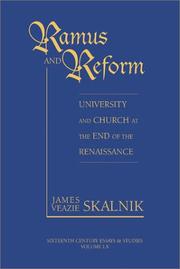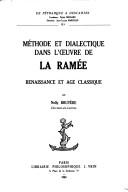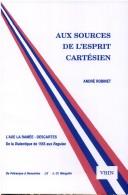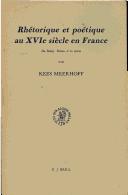| Listing 1 - 10 of 10 |
Sort by
|
Book
ISBN: 9782503574998 2503574998 Year: 2019 Publisher: Turnhout Brepols
Abstract | Keywords | Export | Availability | Bookmark
 Loading...
Loading...Choose an application
- Reference Manager
- EndNote
- RefWorks (Direct export to RefWorks)
Pierre de la Ramée or Petrus Ramus (1515-1572) has long been a controversial figure in educational reform and innovation, from the moment of his first public academic statements in the 1530s, to his reception among scholars in the twentieth and twenty-first centuries. What is beyond dispute, however, is the vast reach of his influence throughout Europe. Ramus’s ideas were disseminated through copious editions and translations of his own textbooks, and in wave after wave of adaptations and re-imaginings of his ideas that swept across the continent. This volume embarks on a European tour of Ramism, using a wide range of previously unpublished or untranslated archival evidence from throughout the continent to examine the dissemination of Ramus’s works and his intellectual influence in geographic and in disciplinary terms. The ten chapters explore the spread of Ramism from his home country of France to Protestant strongholds in Germany, Holland, and Britain, and in the Catholic context of the Iberian peninsula. The book also examines Ramism in the less familiar territories (to most Anglophone readers) of Scandinavia and Hungary, and considers the preceding and contemporary Dutch and German educational reform movements from which Ramus borrowed to forge his own distinctive intellectual method.
Methodology --- Philosophy --- Research --- History --- Ramus, Petrus, --- De La Ramée, Pierre, --- La Ramée, Pierre de, --- Ramée, Pierre de La, --- Ramo, Pedro, --- Ramo, Pietro, --- Ramus, P. --- Ramus, Pʹer, --- Ramus, Peter, --- ראאמוס, --- Influence. --- Ramus, Petrus, 1515-1572 --- Invloed --- Humanities Methodology
Book
ISBN: 9789048135417 9789048135424 9789400732148 Year: 2010 Volume: 25 Publisher: Dordrecht Springer Netherlands
Abstract | Keywords | Export | Availability | Bookmark
 Loading...
Loading...Choose an application
- Reference Manager
- EndNote
- RefWorks (Direct export to RefWorks)
Why should mathematics, the purest of sciences, have a history? Medieval mathematicians took little interest in the history of their discipline. Yet in the Renaissance the history of mathematics flourished. This book explores how Renaissance scholars recovered and reconstructed the origins of mathematics by tracing its invention in prehistoric Antiquity, its development by the Greeks, and its transmission to modern Europe via the works of Euclid, Theon and Proclus. The principal architects of this story -- the French philosopher and University of Paris reformer Peter Ramus, and his critic, the young Oxford astronomy lecturer Henry Savile - worked out diametrically opposed models for the development of the mathematical arts, models of historical progress and decline which mirrored each scholar's larger convictions about the nature of mathematical thinking, the purpose of the modern university, and the potential of the human mind. In their hands, the obscure story of mathematical history became a site of contention over some of the most pressing philosophical and pedagogical debates of the sixteenth century.
Philosophy. --- Philosophy of Science. --- Mathematics, general. --- Classical Studies. --- Philosophy (General). --- Science --- Mathematics. --- Humanities. --- Sciences --- Mathématiques --- Sciences humaines --- Philosophie --- Mathematics --- Math --- History&delete& --- Historiography --- Ramus, Petrus, --- Savile, Henry, --- De La Ramée, Pierre, --- La Ramée, Pierre de, --- Ramée, Pierre de La, --- Ramo, Pedro, --- Ramo, Pietro, --- Ramus, P. --- Ramus, Pʹer, --- Ramus, Peter, --- ראאמוס, --- Savilius, Henricus, --- History

ISBN: 0943549930 9780943549934 Year: 2002 Volume: 60 Publisher: Kirksville (Mo.): Truman State university press
Abstract | Keywords | Export | Availability | Bookmark
 Loading...
Loading...Choose an application
- Reference Manager
- EndNote
- RefWorks (Direct export to RefWorks)
Renaissance --- Humanism --- 378.4 <4> --- Universiteiten--Europa --- 378.4 <4> Universiteiten--Europa --- Philosophy --- Classical education --- Classical philology --- Philosophical anthropology --- Ramus, Petrus, --- De La Ramée, Pierre, --- La Ramée, Pierre de, --- Ramée, Pierre de La, --- Ramo, Pedro, --- Ramo, Pietro, --- Ramus, P. --- Ramus, Pʹer, --- Ramus, Peter, --- ראאמוס, --- France --- Church history --- Ramée, de la, Pierre --- Renaissance - France. --- Humanism - France.
Book
ISBN: 9048135427 9048135419 9786613002907 128000181X Year: 2010 Publisher: New York : Springer,
Abstract | Keywords | Export | Availability | Bookmark
 Loading...
Loading...Choose an application
- Reference Manager
- EndNote
- RefWorks (Direct export to RefWorks)
Why should mathematics, the purest of sciences, have a history? Medieval mathematicians took little interest in the history of their discipline. Yet in the Renaissance the history of mathematics flourished. This book explores how Renaissance scholars recovered and reconstructed the origins of mathematics by tracing its invention in prehistoric Antiquity, its development by the Greeks, and its transmission to modern Europe via the works of Euclid, Theon and Proclus. The principal architects of this story -- the French philosopher and University of Paris reformer Peter Ramus, and his critic, the young Oxford astronomy lecturer Henry Savile – worked out diametrically opposed models for the development of the mathematical arts, models of historical progress and decline which mirrored each scholar’s larger convictions about the nature of mathematical thinking, the purpose of the modern university, and the potential of the human mind. In their hands, the obscure story of mathematical history became a site of contention over some of the most pressing philosophical and pedagogical debates of the sixteenth century.
Mathematics -- History -- To 1500 -- Historiography. --- Philosophy, Renaissance. --- Ramus, Petrus, 1515-1572. --- Savile, Henry, Sir, 1549-1622. --- Mathematics --- Philosophy & Religion --- Physical Sciences & Mathematics --- Mathematics - General --- Philosophy --- History --- Historiography --- History. --- Ramus, Petrus, --- Savile, Henry, --- Math --- Savilius, Henricus, --- De La Ramée, Pierre, --- La Ramée, Pierre de, --- Ramée, Pierre de La, --- Ramo, Pedro, --- Ramo, Pietro, --- Ramus, P. --- Ramus, Pʹer, --- Ramus, Peter, --- ראאמוס, --- Philosophy. --- Philology. --- Philosophy and science. --- Mathematics. --- Philosophy of Science. --- Mathematics, general. --- Classical Studies. --- Science

ISBN: 2711608492 9782711608492 Year: 1984 Volume: 45 Publisher: Paris Vrin
Abstract | Keywords | Export | Availability | Bookmark
 Loading...
Loading...Choose an application
- Reference Manager
- EndNote
- RefWorks (Direct export to RefWorks)
Ramus, Petrus, --- -Dialectic --- Ramus, Petrus --- -Ramus, Petrus --- Methodology --- Dialectic --- Renaissance --- Classicism --- History --- Renaissance. --- Ramus (Petrus). --- Revival of letters --- Philosophy --- Pseudo-classicism --- De La Ramée, Pierre, --- La Ramée, Pierre de, --- Ramée, Pierre de La, --- Ramo, Pedro, --- Ramo, Pietro, --- Ramus, P. --- Ramus, Pʹer, --- Ramus, Peter, --- ראאמוס, --- Research --- Polarity --- Polarity (Philosophy) --- Aesthetics --- Literature --- Civilization, Classical --- Civilization --- History, Modern --- Civilization, Medieval --- Civilization, Modern --- Humanism --- Middle Ages --- Humanities Methodology --- Methodology - History - 16th century --- Dialectic - History - 16th century --- Classicism - History - 16th century --- Ramus, Petrus, - 1515-1572
Book
ISBN: 2728803129 Year: 2004 Volume: 21 Publisher: Paris Ecole normale supérieure
Abstract | Keywords | Export | Availability | Bookmark
 Loading...
Loading...Choose an application
- Reference Manager
- EndNote
- RefWorks (Direct export to RefWorks)
Humanism --- Humanisme --- 873.4 DE LA RAMEE, PIERRE --- 378.4 --- 378.4 <44 PARIS> --- Humanistisch Latijnse literatuur--DE LA RAMEE, PIERRE --- Universiteiten --- Universiteiten--Frankrijk--PARIS --- 378.4 <44 PARIS> Universiteiten--Frankrijk--PARIS --- 378.4 Universiteiten --- 873.4 DE LA RAMEE, PIERRE Humanistisch Latijnse literatuur--DE LA RAMEE, PIERRE --- Education --- Philosophy --- Classical education --- Classical philology --- Philosophical anthropology --- Renaissance --- Ramus, Petrus, --- De La Ramée, Pierre, --- La Ramée, Pierre de, --- Ramée, Pierre de La, --- Ramo, Pedro, --- Ramo, Pietro, --- Ramus, P. --- Ramus, Pʹer, --- Ramus, Peter, --- ראאמוס, --- Ramus, Petrus --- La ramee (pierre de), 1515-1572 --- Critique et interpretation --- Opinion publique
Book
ISBN: 3796515606 9783796515606 Year: 2001 Volume: 1 Publisher: Basel Schwabe
Abstract | Keywords | Export | Availability | Bookmark
 Loading...
Loading...Choose an application
- Reference Manager
- EndNote
- RefWorks (Direct export to RefWorks)
The volume originated in a workshop, held in the Bibelsaal of the Herzog August Library of Wolfenbüttel and devoted to an examination of the influence of Petrus Ramus. The papers, revised for publication, deal with the diverse use made of Ramus both by followers and adversaries in the religious and scholarly controversies that raged throughout (mainly) Protestant Europe during the late sixteenth and early seventeenth centuries. In terms of organization the volume is divided along regional and thematic issues. The impact of Ramist ideas on Calvinism informs a first group of papers concentrating on various Reformed territories: Switzerland (Wolfgang Rother), the Netherlands (Theo Verbeek), Bremen and Gdansk (Thomas Elsmann). A second group examines Lutheran responses to Ramus: Joseph Freedman analyzes Melanchthons view, Riccardo Pozzo evaluates the criticism by the Helmstedt Aristotelians, and Erland Sellberg scrutinizes Ramus reception at the Swedish universities. Two further contributions probe the Ramist debate in the British Isles: in England (Mordechai Feingold) and in Ireland (Elizabethanne Boran). The section devoted to thematic issues places Ramus within Renaissance disciplines where his impact was most keenly felt: logic and literature (Kees Meerhoff), historiography and jurisprudence (Guido Oldrini), law and medicine (Ian Maclean), and astronomy (Nicholas Jardine and Alain Segonds). Content: Wolfgang Rother, Ramus and Ramism in Switzerland Theo Verbeek, Notes on Ramism in the Netherlands Thomas Elsmann, The Influence of Ramism on the Academies of Bremen and Danzig: A Comparison Joseph S. Freedman, Melanchthons Opinion of Ramus and the Utilization of Their Writings in Central Europe Riccardo Pozzo, Ramus Metaphysics and its Criticism by the Helmstedt Aristotelians Erland Sellberg, The Usefulness of Ramism Mordechai Feingold, English Ramism: A Reinterpretation Elizabethanne Boran, Ramism in Trinity College, Dublin in the Early Seventeenth Century Kees Meerhoff, Beauty and the Beast: Nature, Logic and Literature in Ramus Guido Oldrini, The Influence of Ramus Method on Historiography and Jurisprudence Ian Maclean, Logical Division and Visual Dichotomies: Ramus in the Context of Legal and Medical Writing Nicholas Jardine and Alain Segonds, A Challenge to the Reader: Ramus on Astrologia without Hypotheses.
Philosophy, Renaissance --- Science, Renaissance --- Protestants --- Philosophie de la Renaissance --- Sciences de la Renaissance --- Intellectual life --- Vie intellectuelle --- Ramus, Petrus, --- Philosophy --- Science --- History --- Filosofie. --- Influence (Literary, artistic, etc.). --- Invloed. --- Philosophy, Renaissance. --- Philosophy. --- Rezeption. --- Science. --- Wetenschap. --- Églises protestantes --- Histoire --- Congrès --- Doctrines --- Ramus, Petrus. --- Influence --- Congrès. --- 1500-1699. --- Geschichte 1550-1700. --- Wolfenbüttel <1997>. --- Philosophy, Modern --- Natural science --- Science of science --- Sciences --- Modern philosophy --- De La Ramée, Pierre, --- La Ramée, Pierre de, --- Ramée, Pierre de La, --- Ramo, Pedro, --- Ramo, Pietro, --- Ramus, P. --- Ramus, Pʹer, --- Ramus, Peter, --- ראאמוס, --- Intellectual life. --- Natural sciences --- Philosophy, Renaissance - Congresses. --- Philosophy - History - 17th century - Congresses. --- Science - History - 16th century - Congresses. --- Science - History - 17th century - Congresses.

ISBN: 2711612635 9782711612635 Year: 1996 Volume: 60 Publisher: Paris Vrin
Abstract | Keywords | Export | Availability | Bookmark
 Loading...
Loading...Choose an application
- Reference Manager
- EndNote
- RefWorks (Direct export to RefWorks)
Dialectic --- Methodology --- Philosophy, French --- Logic, Modern --- Knowledge, Theory of --- Dialectique --- Méthodologie --- Philosophie française --- Logique moderne --- Théorie de la connaissance --- History --- Histoire --- Descartes, René, --- Ramus, Petrus, --- Influence --- History. --- -Polarity --- Polarity (Philosophy) --- Descartes, Rene --- Ramus, Petrus --- -Influence --- -History --- -Ramus, Petrus --- Méthodologie --- Philosophie française --- Théorie de la connaissance --- Descartes, René, --- De La Ramée, Pierre, --- La Ramée, Pierre de, --- Ramée, Pierre de La, --- Ramo, Pedro, --- Ramo, Pietro, --- Ramus, P. --- Ramus, Pʹer, --- Ramus, Peter, --- ראאמוס, --- Influence. --- Dialectic - History. --- Cartésianisme. --- La Ramée, Pierre de, --- Critique et interprétation
Book
ISBN: 3319952579 3319952587 Year: 2018 Publisher: Cham : Springer International Publishing : Imprint: Palgrave Macmillan,
Abstract | Keywords | Export | Availability | Bookmark
 Loading...
Loading...Choose an application
- Reference Manager
- EndNote
- RefWorks (Direct export to RefWorks)
The Rational Shakespeare: Peter Ramus, Edward de Vere, and the Question of Authorship examines William Shakespeare’s rationality from a Ramist perspective, linking that examination to the leading intellectuals of late humanism, and extending those links to the life of Edward de Vere, Seventeenth Earl of Oxford. The application to Shakespeare’s plays and sonnets of a game-theoretic hermeneutic, an interpretive approach that Ramism suggests but ultimately evades, strengthens these connections in further supporting the Oxfordian answer to the question of Shakespearean authorship.
Shakespeare, William, --- Ramus, Petrus, --- Oxford, Edward De Vere, --- Bulbecke, Edward de Vere, --- De Vere, Edward, --- Edward, --- Oxenford, Edward de Vere, --- Vere, Edward de, --- De La Ramée, Pierre, --- La Ramée, Pierre de, --- Ramée, Pierre de La, --- Ramo, Pedro, --- Ramo, Pietro, --- Ramus, P. --- Ramus, Pʹer, --- Ramus, Peter, --- ראאמוס, --- Šekspir, Vil'jam --- Authorship. --- Literature-History and criticism. --- Literature, Modern. --- Shakespeare, William, 1564-1616. --- Logic. --- Literary History. --- Shakespeare. --- Argumentation --- Deduction (Logic) --- Deductive logic --- Dialectic (Logic) --- Logic, Deductive --- Intellect --- Philosophy --- Psychology --- Science --- Reasoning --- Thought and thinking --- Modern literature --- Arts, Modern --- Methodology --- Literature—History and criticism. --- Literature --- European literature --- Early Modern and Renaissance Literature. --- Literature, Renaissance --- Renaissance literature --- Literature, Modern --- Appraisal of books --- Books --- Evaluation of literature --- Criticism --- Literary style --- History and criticism. --- Renaissance, 1450-1600. --- Appraisal --- Evaluation

ISBN: 9004077065 9789004077065 9789004476745 Year: 1986 Volume: 36 Publisher: Leiden Brill
Abstract | Keywords | Export | Availability | Bookmark
 Loading...
Loading...Choose an application
- Reference Manager
- EndNote
- RefWorks (Direct export to RefWorks)
Poetry --- Literary rhetorics --- French literature --- retoriek --- anno 1500-1599 --- France --- French poetry --- Rhetoric --- French language --- Poetics --- Poésie française --- Rhétorique --- Français (Langue) --- Poétique --- History and criticism --- Theory, etc --- Roman influences --- Histoire et critique --- Théorie, etc --- Influence romaine --- Du Bellay, Joachim, --- Ramus, --- Rhetoric, Renaissance --- Renaissance --- Versification --- History --- Ramus, Petrus, --- -French poetry --- -Renaissance --- -Rhetoric, Renaissance --- -Poetics --- -840 "15" --- 82.085 --- 094:82-5 --- Langue d'oïl --- Romance languages --- Renaissance rhetoric --- Revival of letters --- Civilization --- History, Modern --- Civilization, Medieval --- Civilization, Modern --- Humanism --- Middle Ages --- -Franse literatuur--?"15" --- Retorica. Argumentatieleer. Voordrachtkunst --- Oude en merkwaardige drukken. Kostbare en zeldzame boeken. Preciosa en rariora-:-Retoriek. Redevoering --- Technique --- Du Bellay, Joachim --- Ramus, Petrus --- Rhetoric, Renaissance. --- Rhetoric. --- Versification. --- Roman influences. --- Theory, etc. --- 094:82-5 Oude en merkwaardige drukken. Kostbare en zeldzame boeken. Preciosa en rariora-:-Retoriek. Redevoering --- 82.085 Retorica. Argumentatieleer. Voordrachtkunst --- 840 "15" Franse literatuur--?"15" --- Franse literatuur--?"15" --- Poésie française --- Rhétorique --- Français (Langue) --- Poétique --- Théorie, etc --- du Bellay, Joachim --- 840 "15" --- History and criticism&delete& --- De La Ramée, Pierre, --- La Ramée, Pierre de, --- Ramée, Pierre de La, --- Ramo, Pedro, --- Ramo, Pietro, --- Ramus, P. --- Ramus, Pʹer, --- Ramus, Peter, --- ראאמוס, --- French poetry - 16th century - History and criticism - Theory, etc --- French language - Middle French, 1300-1600 - Versification --- French language - Middle French, 1300-1600 - Rhetoric --- Poetics - History - 16th century --- French poetry - Roman influences --- Renaissance - France --- Du Bellay, Joachim, - approximately 1522-1560 - Deffence et illustration de la langue françoyse --- Ramus, Petrus, - 1515-1572
| Listing 1 - 10 of 10 |
Sort by
|

 Search
Search Feedback
Feedback About UniCat
About UniCat  Help
Help News
News